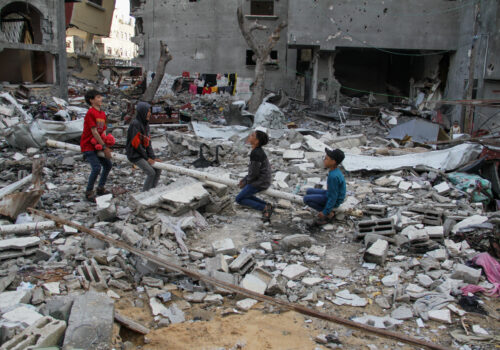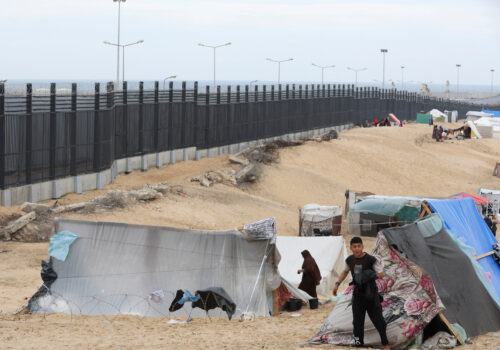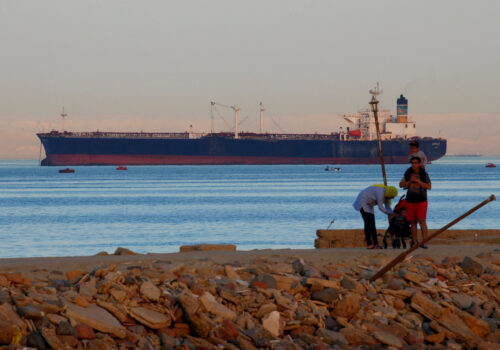A Rafah invasion might kill peace between Israel and Egypt
Relations between Egypt and Israel have soured in recent weeks as Israel prepares to launch a full-scale ground offensive into Rafah in the southern Gaza Strip—a move that Cairo has warned would put its peace treaty with Israel at risk and destabilize the region.
Egypt fears a sweeping assault on Rafah—where more than one million displaced Palestinians have sought refuge from Israel’s incessant bombardment of the northern and central Gaza Strip—may force hundreds of thousands of Palestinian refugees to storm the Rafah border and cross into the Sinai Peninsula with little prospect of ever returning.
If Israel goes ahead with its planned incursion, Egypt will most certainly come under immense internal and external pressure to open the Rafah border crossing and allow a mass influx of refugees into Sinai. This has long-term implications for the country. Hamas and members of other extremist groups might make their way into Egypt among those who enter. Over time, they could export instability to Sinai by launching attacks against Israel from Rafah on the Egyptian side. Should Israel decide to respond with a counterattack, this would harm relations with Cairo and hurt the Camp David Accords signed in 1978, dragging Egypt into a new war with Israel.
SIGN UP FOR THIS WEEK IN THE MIDEAST NEWSLETTER
President Abdel Fattah al-Sisi has made clear from the start that he categorically rejects any attempt to resolve the Palestinian-Israeli conflict at the expense of other countries. Sisi has also rejected the displacement of Palestinians into Egypt, saying that would be tantamount to “the liquidation of the Palestinian cause.” Moreover, Egypt does not want to be seen as being complicit in the “ethnic cleansing” of the Palestinians.
In recent days, Cairo and Jerusalem have traded accusations regarding the closure of the Rafah border crossing which has prevented humanitarian aid from passing through.
On May 14, Israeli Foreign Minister Israel Katz said, “The world places the responsibility for the humanitarian situation on Israel, but the key to preventing a humanitarian crisis in Gaza “is now in the hands of our Egyptian friends.”
Katz’s remarks evoked a stern rebuke from his Egyptian counterpart, Sameh Shoukry, who counter-accused Israel of distorting facts by trying to deflect responsibility for the unprecedented humanitarian crisis and passing the buck to Egypt. The Egyptian foreign minister called on Israel to fulfill its legal obligation as the occupying power by allowing aid to enter through the land ports under its control. He noted that Israel’s capture of the Rafah crossing and its military campaign in the border area were the reasons for the closure as the shelling around the area endangered the lives of aid workers and truck drivers.
Israel’s May 7 takeover of the Gaza side of the Rafah crossing—a key artery of aid—is the main reason behind the chill in relations between Egypt and Israel. Cairo sees it as a breach of the peace treaty and, in particular, a violation of the 2005 Philadelphi Accord which had allowed Egypt to deploy 750 border guards along the border with Gaza.
Another reason for the escalating tensions between the two neighboring countries is Israel’s intransigence in ceasefire talks mediated by Egypt, Qatar, and the United States. Israel rejected the ceasefire plan proposed by Egypt and Qatar, insisting that it had not been consulted about the terms of the deal which Hamas accepted.
Announcing the Israeli war cabinet’s rejection of the deal on May 6, Israeli Prime Minister Benjamin Netanyahu said, “Our opponents’ expectations are unacceptable.” The proposed deal would have seen a gradual release of the remaining Israeli hostages in exchange for Palestinian detainees and the withdrawal of Israeli troops from Palestinian territories. A source close to the ceasefire talks told me that a bone of contention had been whether an initial ceasefire would be made permanent and at what point it would turn into a lasting ceasefire.
After Israel’s rejection of the ceasefire deal, Netanyahu defiantly announced he would go ahead with his planned incursion into Rafah; the Israeli Defense Forces (IDF) ordered the displaced Palestinians to evacuate into an even narrower strip of land—to the chagrin of the Egyptian leadership, which has since taken several retaliatory steps to pressure Israel to rescind its decision.
For one, Cairo announced on May 12 that it would back South Africa’s genocide case against Israel at the International Court of Justice (ICJ), calling the Rafah military operation ”a flagrant violation of international law.” Israeli officials expressed their disappointment with the decision, telling Haaretz that while the move ”is not expected to have a material effect on the ICJ’s legal process, it reflected a new low in relations between the two countries.”
Egypt has also halted the transfer of humanitarian aid through the Rafah crossing in protest of Israel’s takeover of the strategic gateway—the sole exit point for Palestinians trying to flee the violence. There has also been talk in recent days of Cairo contemplating the downgrading of its relations with Jerusalem—a rumor that the Egyptian government has neither confirmed nor denied. Some analysts believe it is unlikely that Egypt will withdraw its ambassador from Jerusalem. Such rhetoric is meant to pile pressure on Israel to reverse course and withdraw its troops from Rafah.
May 16 Israeli media reports of the IDF sending an additional brigade to Rafah to prepare for an expansion of the ground offensive have caused alarm in Egypt. Some analysts, like Hassan Nafaa, a professor of political science at Cairo University see it as a direct threat to Egypt’s security and stability.
“Expanding the ground offensive in Rafah would not only result in a catastrophic humanitarian crisis but would also constitute a direct threat to Egypt’s security and stability,” Nafaa told me. He urged President Sisi to warn Israel that Rafah was a “red line” as it is the last haven for the displaced Palestinians and called for the severing of diplomatic ties as a pressure card to force Israel to end the war.
At a recent Arab Summit held in Bahrain’s capital, Manama, Sisi criticized Israel for moving ahead with its ground offensive into Rafah despite warnings of the dire consequences of such an invasion for the entire region. He further lambasted Israel’s takeover, calling it a tightening of the siege on the Gaza Strip. His fiery remarks—the harshest criticism of Israel since the start of the war on October 9, 2023—reflect a change of heart on the part of Cairo which Israel had perceived as sharing its goal of eliminating Hamas. Sisi’s turnabout also signals a closer alignment with public opinion in Egypt: the majority of Egyptians are sympathetic toward the Palestinians and are outraged by the graphic scenes of dead and orphaned children they are witnessing daily on their television screens and social media platforms.
In what appears to be a hate crime, an Israeli-Canadian businessman was fatally shot by unknown assailants in the coastal city of Alexandria on May 7, the second such revenge attack since the start of the Israel-Hamas war. On October 8, 2023, two Israeli tourists and their Egyptian guide were gunned down by a policeman at an archaeological site in the same city known as Pompey’s Pillar. While the assailant who carried out the October attack was arrested, the gunmen in the attack on May 7 managed to escape and remain at large. The attacks signal the start of what could become a disturbing trend of tit for tat killings of Israelis visiting or residing in Egypt.
There has been no official response from Jerusalem regarding Cairo’s about-face and the recent escalation between the two countries. Still, diplomatic efforts are likely under way behind the scenes to contain the growing diplomatic row. Whether or not those efforts meet with success remains to be seen, but the rising tensions reflect the fragility of ties between Egypt and Israel, which fought several wars between 1948 and 1979 but have a peace treaty allowing for a cold peace to have largely prevailed between them.
However, the decade since Sisi took power in 2014 has witnessed a thaw in relations as Cairo and Jerusalem moved to strengthen their bilateral ties and, in particular, bolster their security and economic cooperation. In 2017, Israel allowed Egypt to beef up its troop presence in the Sinai Peninsula beyond the terms of the Camp David Accords. Cairo has also continued to play its traditional role as a key mediator between Israel and Hamas and between Palestinian factions. Egypt’s intention to pull out of hostage deal mediation efforts and the continued closure of the Rafah border crossing are alarm bells for Israel, signaling that it can no longer take Cairo’s support for granted.
With relations between the two countries on the brink, Cairo has a set of demands that can help defuse tensions.
“We are calling on Israel to cease fire immediately to allow humanitarian aid to reach the displaced Palestinians,” Major General Samir Farag, a military strategist and analyst, told me. He continued, “Secondly, we want Israel to withdraw from the Rafah border crossing on Gaza’s side and allow the border area to be administered by Palestinians (excluding Hamas.) Moreover, Israel must coordinate closely with Egypt about the next steps and the post-war scenario. But above all, Israel must heed Cairo’s warnings about an expanded ground incursion into Rafah.”
The time is ripe for the Joe Biden administration to iron out differences between the two sides before relations further deteriorate.
Shahira Amin is a nonresident senior fellow at the Atlantic Council’s Scowcroft Middle East Security Initiative and an independent journalist based in Cairo. A former contributor to CNN’s Inside Africa, Amin has been covering the development in post-revolution Egypt for several outlets, including Index on Censorship and Al-Monitor. Follow her on X: @sherryamin13.
Further reading
Fri, Apr 12, 2024
Dispatch from Gaza: ‘My son, every night he screams and convulses’
MENASource By Arwa Damon
Arwa Damon arrived in the Gaza Strip on a humanitarian mission for her charity, INARA, two days after the Israeli airstrike on the World Central Kitchen convoy. This is what she saw.
Sun, Feb 18, 2024
Regardless of Sisi’s decision on Palestinian refugees in Rafah, he will not emerge as a winner
MENASource By Shahira Amin
Now that Israel has clarified its intent to undertake operations in Rafah, after evacuating the nearly 1.4 million displaced Palestinians who have sought a safe haven in the Gaza Strip’s southern city, it may only be a matter of time before the Egyptian's president's true intentions are revealed.
Thu, Feb 8, 2024
Houthi attacks on ships in the Red Sea add to Egypt’s economic troubles
MENASource By Shahira Amin
The decline in Suez Canal revenues has put further strain on Egypt's already faltering economy at a time when the country faces a severe foreign currency shortage.
Image: A camp for internally displaced Palestinians near the border with Egypt, in Rafah A camp for internally displaced Palestinians near the border with Egypt, in Rafah, southern Gaza Strip, 09 May 2024 issued 10 May 2024. The Israel Defence Forces IDF on 06 May called on residents of eastern Rafah to temporarily evacuate to an expanded humanitarian area. On 07 May the IDF stated that its ground troops began an overnight operation targeting Hamas militants and infrastructure within specific areas of eastern Rafah, taking operational control of the Gazan side of the Rafah crossing based on intelligence information. More than 34,600 Palestinians and over 1,455 Israelis have been killed, according to the Palestinian Health Ministry and the ID Copyright: xapaimagesxOmarxAshtawyxxapaimagesx


